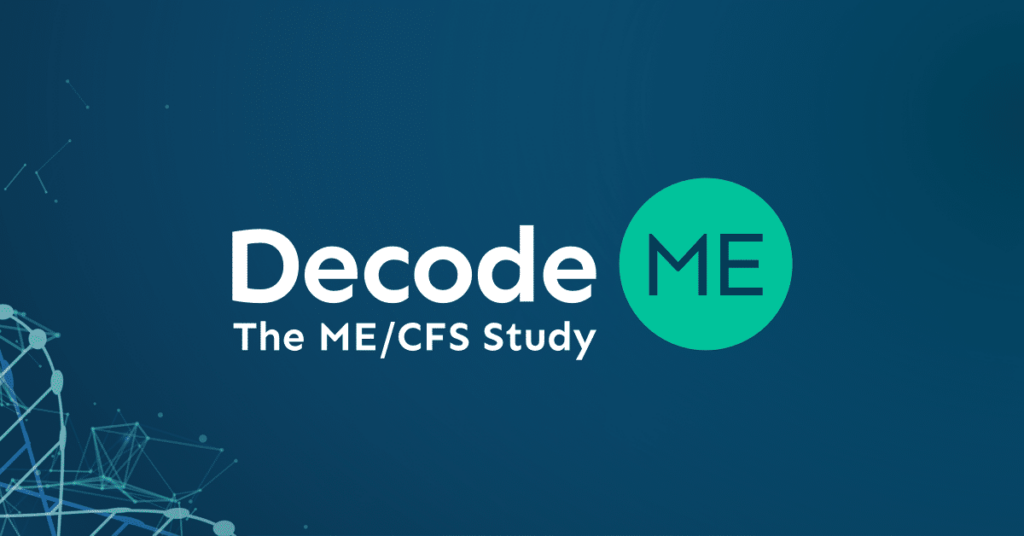
The world's largest ME/CFS research study, DecodeME, has released the initial DNA results, following the initial analysis of 15,579 DNA samples!
DecodeME is funded by the Medical Research Council (MRC) and the National Institute for Health Research (NIHR). and recruited over 26,000 people with ME/CFS, across the UK.
The initial analysis has found that people with a diagnosis of ME/CFS have significant genetic differences in their DNA compared to the general population. These differences exist across the genome, and do not impact just one gene.
These findings reflected causes, rather than effects, of ME/CFS because DNA does not change with ME/CFS onset.
The signals discovered are involved in the immune and the nervous systems, pointing to immunological and neurological causes.
At least two of these signals relate to the body's response to infection, while others point to the nervous system, one of which has previously been found in other research, in people experiencing chronic pain, reinforcing neurological contributions to ME/CFS. These signals align with how people with ME/CFS describe their illness.
DecodeME is a genetic study that is looking at the differences in the DNA of people with ME/CFS, compared to those without, to find out more about the potential genetic cause or factors in developing ME.
This is completed through a Genetic Wide Association Study (GWAS) which looks at approximately one million sites across the genome where scientists suspect they may see differences compared to the healthy control group.
The sites that the GWAS looks at relate to different parts of the body, such as the immune system, nervous system or mitochondria. If different genetic signals are found, these can provide clues to how ME/CFS develops, building a greater understanding of the underlying mechanisms of the condition.
The DNA analysis uses over 18,000 participant’s DNA samples (all with ME) and comparing them to healthy control samples from UK Biobank.
You can learn more about the science behind the study, here.
The DecodeME study also collected data from participants through two anonymous survey questionnaires.
The findings from the first questionnaire can be found, here.
The second questionnaire is undergoing analysis, and the findings will be shared later this year.
The data from these questionnaires provide valuable insights into the experience of people with ME and an understanding of what it’s like to live with the condition.
DecodeME has built the world’s largest dataset on ME/CFS and launched its data access process last year.
This means that other researchers can apply to use this valuable dataset for further research into the field. 86% of DecodeME participants consented to sharing their de-identified data with other researchers and 95% of participants consented to being recontacted for new research projects.
You can find more details on the data access process and how to apply, here.
A team of genetics experts at the MRC Human Genetics Unit at the University of Edinburgh are leading the scientific analysis of the study, led by Chris Ponting.
Professor Ponting was notably involved in the Human Genome Project, an international research effort to map the DNA sequence of an entire human genome. When asked about the DecodeME project Chris Ponting says:
"Genome-wide association studies, like the DecodeME study, have already proved successful in helping to uncover the biological roots of many other complex diseases including type 2 diabetes and Alzheimer’s disease. This is the first sizeable DNA study of ME/CFS, and any differences we find compared to control samples will serve as important biological clues. Specifically, we believe the results should help identify genes, biological molecules and types of cells that may play a part in causing ME/CFS."
Patient and Public Involvement (PPI) has been central in the DecodeME partnership. Sonya Chowdhury our CEO chairs the PPI Steering Group and is also the co-investigator on the Management Group says:
"People with lived experience of ME/CFS are at the very heart of the DecodeME project and our Patient and Participant Involvement (PPI) group has worked closely with researchers on all aspects of the study. Their profound involvement has been so transformational that we firmly believe it sets a new standard for health research in this country."
Patient and Public Involvement (PPI) has been central to the development of the study.
The study has also incorporated feedback and ideas from the wider community into the study design.
For example, people with ME , carers and ME charity members have been included every step of the way of study design to ensure it was planned with all severities and experiences in mind.
The group also had extensive involvement in the two DecodeME questionnaire as well as the marketing strategy and budget.
People with lived experience are still continuously updated on and involved in the study's development, including analysing, interpreting and communicating about the study’s findings.
